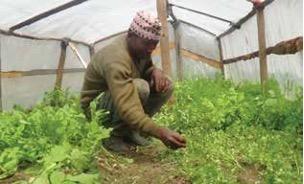Raralihi’s Model Collection Center for Agricultural Products stands as a testament to the thriving potential of local farming and community collaboration
Nand Bohara, hailing from Tila Gaunpalika Ward No. 2, finds himself invigorated by the recent surge in local crop production. Nowadays, he ardently advocates for the promotion of indigenous crops, a stark contrast to the time when he temporarily abandoned local crop cultivation upon relocating to Kaala Pahad. No longer relegated to seeking sustenance and clothing elsewhere, Nand shares that the allure of foreign rice has been erasing the presence of local products.
An unfounded misconception persists that consuming self-cultivated food tarnishes one’s honor and standing. The consumption of external fare is often considered emblematic of a village’s prosperity. However, as Nand began wholeheartedly embracing grains from his own village, the need for imported sustenance waned. To cater to the community’s needs, a pioneering collection center was established to facilitate the aggregation and marketing of local produce. Nand’s commitment to this endeavor is evident as he dedicates his days to its operation, diligently marketing and vending the products.
With a heavy heart, Nand reminisces about his days as a laborer in the streets of India. He now underscores that self-sufficiency can be achieved without reliance on others, even if it entails tending to the soil of one’s homeland to boost production. The collection center boasts an array of offerings, including Simi, black lentils, red lentils, Gahat beans, honey, Radi-Pakhi, powdered nettle, herbal tea, peas, Gurans flowers, Phaper, apples, spinach, Chino, Kaguno, Marsi rice, maize, Jau (barley), soybeans, tomatoes, and Kanya mushrooms. From grains to vegetables and herbs, the collection center showcases a plethora of local products. Nand notes that the center has become a must-visit destination for students, observers, and tourists alike, drawing them in to both experience and purchase these indigenous goods.
Local resident Jayadhan Rokaya reveals that Pace Nepal laid the foundation for this collection center in 2071 with an investment of Rs 1 lakh 83 thousand rupees. Since its inception, the center has provided a platform for farmers to consolidate and market their produce. As a result, farmers are now able to sell their goods at higher prices in nearby wholesale markets. Shri Kishore Neupane, Executive Director of Pace Nepal, has proposed that the center transition into a cooperative entity through mobile fund initiatives. This cooperative approach aims to safeguard local products and explore processing and packaging methods that can yield profits for farmers.
During the winter, non-biodegradable items find their place within the collection center, while the rainy season sees an influx of food and grains, including apples, Simi, potatoes, maize, and soybeans. Additionally, locally-crafted garments and apparel are available for purchase at the center. The core values of our environment, life, and responsibilities underpin the center’s mission. Local residents proudly affirm that the collection center sources local products from all four customary VDCs (Village Development Committees) within Tila Rural Municipality.


